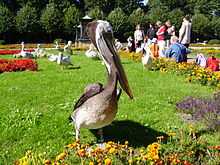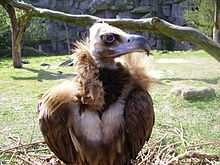Tierpark Berlin
 Main entrance | |
| Date opened | 1955 |
|---|---|
| Location | Berlin, Germany |
| Coordinates | 52°30′01″N 13°31′57″E / 52.50028°N 13.53250°ECoordinates: 52°30′01″N 13°31′57″E / 52.50028°N 13.53250°E |
| Land area | 160 hectares (400 acres) |
| Number of animals | 7,250 (December 2013)[1] |
| Number of species | 846 (December 2013)[1] |
| Annual visitors | 1,035,899 (2013)[1] |
| Memberships | EAZA[2] |
| Website | www.tierpark-berlin.de |


The Tierpark Berlin is one of two zoos located in Berlin, Germany. It was founded in 1955 and is located in Friedrichsfelde on the former grounds of Friedrichsfelde Palace, which is situated within the zoo. As of 31 December 2013, the zoo houses 7,250 animals from 846 species,[1] in an area of 160 hectares (400 acres). Tierpark Berlin also features two public exhibits which are free of charge, including the Bärenschaufenster (Bear Show Window) which currently houses American black bears.
Tierpark Berlin is a member of the European Association of Zoos and Aquaria (EAZA) and participates in about 120 European Breeding Programmes (EEP). It maintains the international studbooks for endangered species of deer and wild asses of Asia and Africa as well as the European studbook for little pied cormorants.[3] The zoo further participates in attempts of reintroducing species to areas where they have become endangered or extinct and it financially supports selected in situ projects for the protection of natural habitats.[4]
History
Founded in 1955, it was originally established as a counterpart of the famous Berlin Zoological Garden, located in what was then West Berlin and soon to be out of reach for residents of the former Eastern sector. The initial bear enclosures featured natural rocks and artificial waterfalls, while large paddocks surrounded by old trees and canals were designed for camels and bison. In the following years and decades, other exhibits, aviaries, and larger buildings were added to accommodate a selection of carnivores, ungulates, reptiles and birds, as well as primates, including great apes. A large building for elephants and other pachydermy was completed just a few years before East and West Berlin were reunited. Despite serious discussions dealing with a possible closure of the park, the Nineties saw a process of replacing improvised or damaged structures as well as expanding the zoo with new areas for African ungulates and primates, as well as species from alpine regions of Asia and Europe. At the same time, Berlin Tierpark, which now was designated to complement Berlin Zoological Garden, had to give up some species such as great apes. In recent years the zoo has become famous for its successful elephant breeding programme. It is also one of the few zoos in Western Europe that houses various large herds of ungulates, including some rarely kept species such as muskoxen and takin. Due to economic challenges, Berlin Tierpark recently issued a new master plan which identifies a number of potential attractions and revenues, though the funding for the proposed projects is not clear.[citation needed]
Statistics
|
|
Directors
The first director (1955–1990) of the Tierpark Berlin-Friedrichsfelde, Heinrich Dathe, was a well-known scientist. He edited five scentitific journals and wrote more than 1,000 scientific and popular papers and books. [5] He was succeeded by Bernhard Blaszkiewitz.
See also
Notes
- ↑ 1.0 1.1 1.2 1.3 1.4 1.5 Tierpark Berlin: Tierstatistik 2013. Retrieved 18 January 2014.
- ↑ "EAZA Member Zoos & Aquariums". eaza.net. EAZA. Retrieved 27 May 2011.
- ↑ . Retrieved 2012-09-06.
- ↑ . Retrieved 2012-09-06.
- ↑ Strehlow, Harro, "Zoological Gardens of Western Europe", in Zoo and Aquarium History: Ancient Collections to Zoological Gardens, Kisling, Vernon N. (ed.), CRC Press, Boca Raton, 2001, p.109. ISBN 0-8493-2100-X
External links
![]() Media related to Tierpark Berlin at Wikimedia Commons
Media related to Tierpark Berlin at Wikimedia Commons
| ||||||||||||||||||||